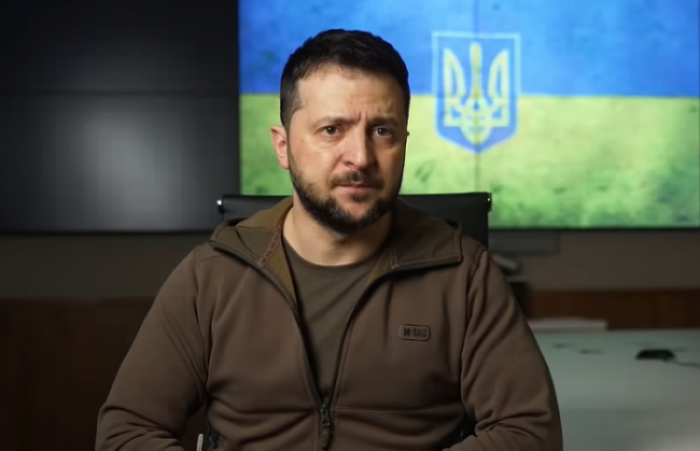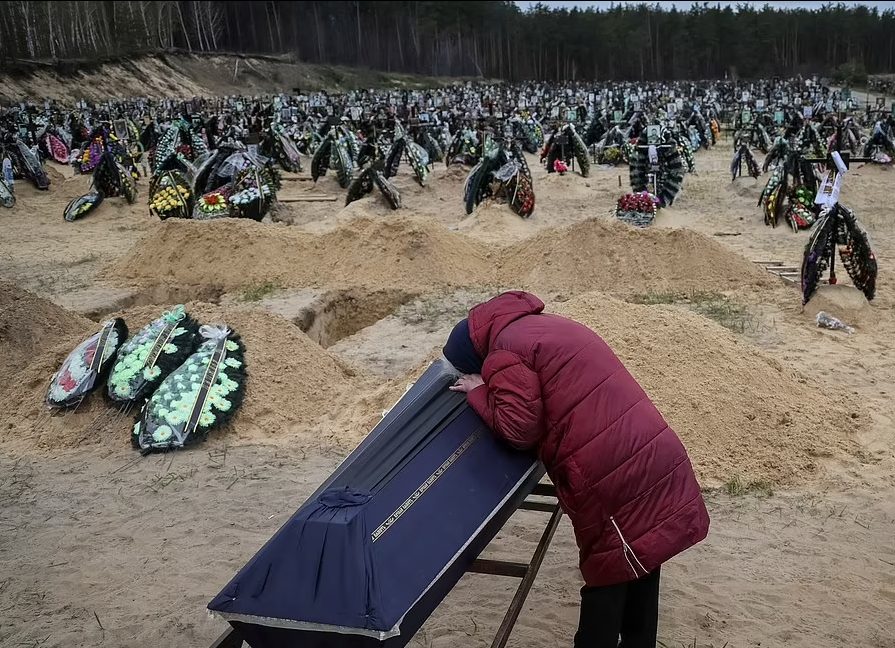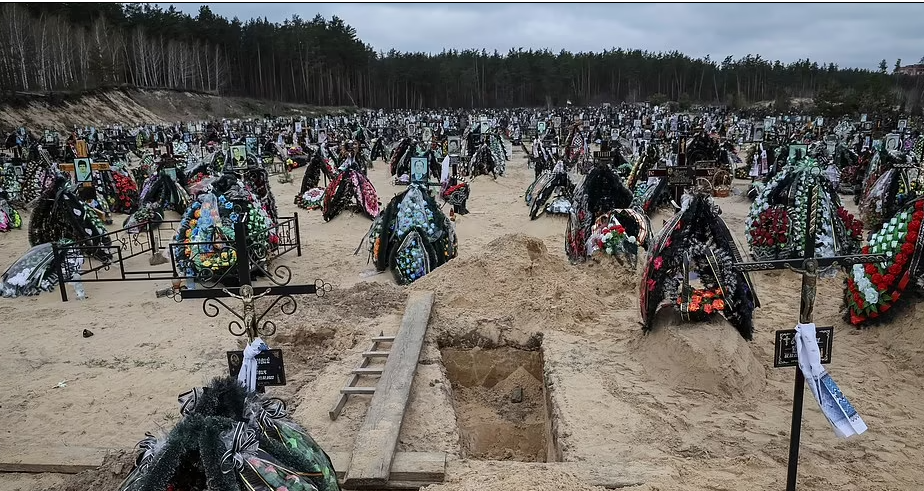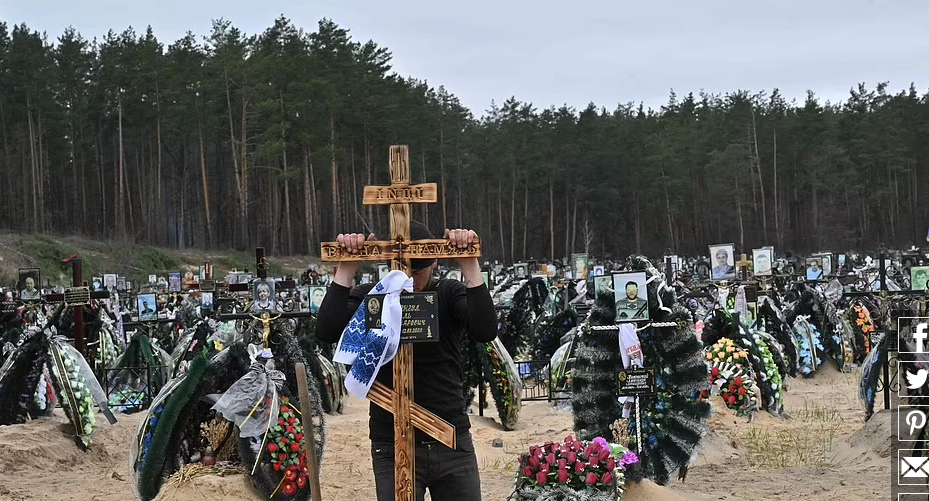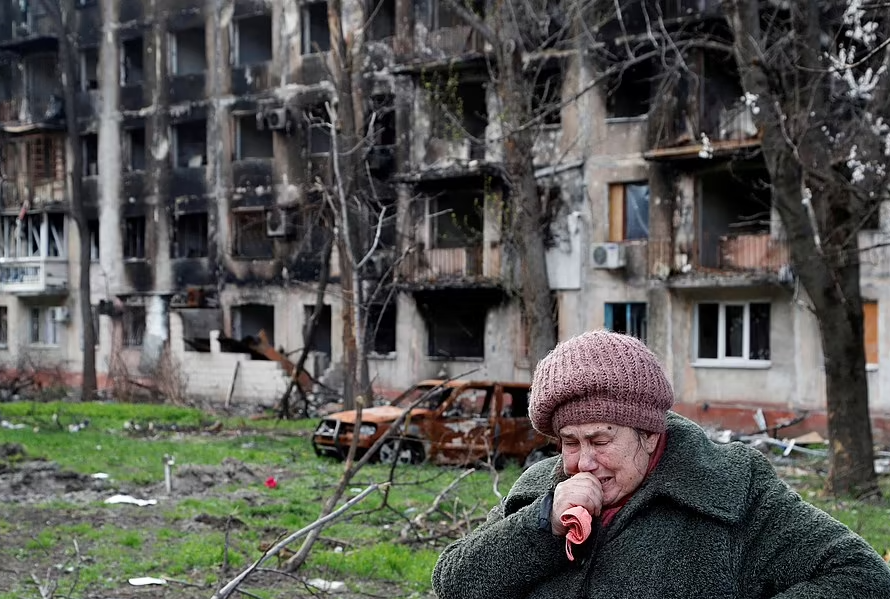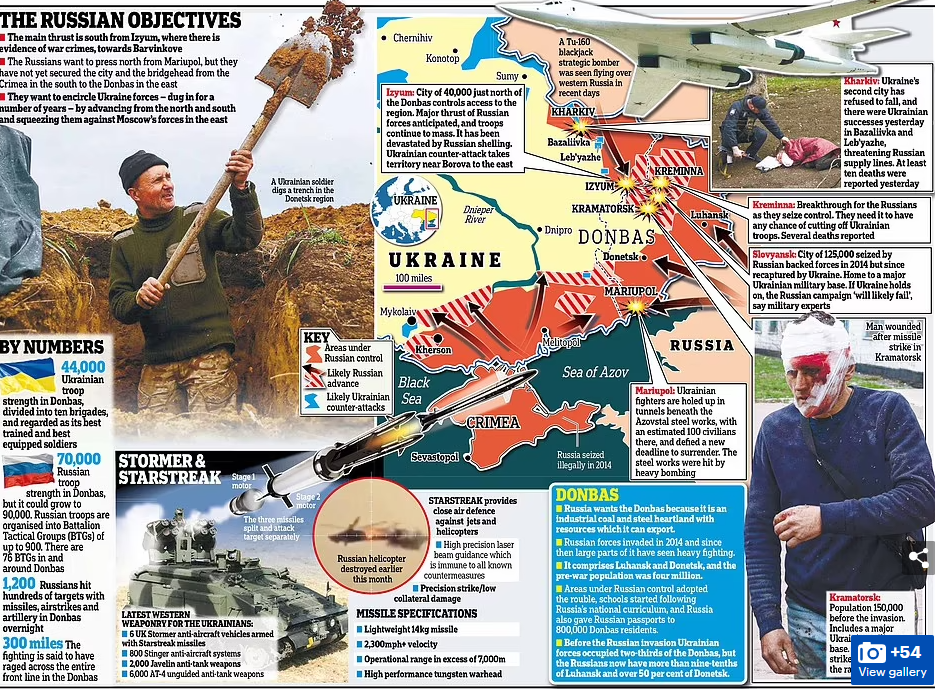Volodymyr Zelensky has condemned the Russian army as ‘the most barbaric and inhuman in the world’ and said the country will be stained ‘as a source of absolute evil for generations’ as Vladimir Putin’s men stepped up attacks across the country in an effort to seize bloody victory from the jaws of defeat.
Zelensky, in a late-night address to his nation, said Putin’s military has been ‘purposefully killing civilians’ with weapons banned under international law and that once the full scope of their ‘war crimes’ comes to light ‘a Russian passport will mean only one thing in any country: Unequivocal condemnation from all decent people.’
The talismanic president also used the speech to praise his armed forces and people for resisting the invasion as fighting enters its 55th day today, while renewing calls for Ukraine’s western allies to send more weapons faster in order to ensure the Russian army is defeated.
If Ukraine had access to the same kinds of weapons being used by Russia, Zelensky said, then ‘we would have already ended this war.’ Only the West is capable of providing such weapons, he added.
He spoke after the Ukrainian military said it had managed to repel numerous Russian advances in the eastern Donbas region on Tuesday, as the opening stages of what is likely to be the war’s defining battle get underway.
British military intelligence said Moscow hit more than 1,200 targets with bombs and artillery across a 300-mile stretch of frontline near Donetsk and Luhansk as it tries to break through Ukrainian defences – but continues to suffer ‘environmental, logistical and technical challenges’ of the kind that thwarted its efforts to take Kyiv.
The UK Government department wrote: ‘Russian shelling and strikes on the Donbas line of control continue to increase, with the Ukrainians repelling numerous attempted advances by Russian forces.
‘Russia’s ability to progress continues to be impacted by the environmental, logistical and technical challenges that have beset them so far, combined with the resilience of the highly-motivated Ukrainian armed forces.’
It continued: ‘Russia’s inability to stamp out resistance in Mariupol and their indiscriminate attacks, which have harmed the resident civilian populace, are indicative of their continued failure to achieve their aims as quickly as they would like.’
Briefing Cabinet ministers in the morning, Boris Johnson described Ukraine’s predicament as ‘perilous’, with Vladimir Putin seemingly determined to claim victory ‘regardless of the human cost’.
Ministers were briefed by a senior national security official who said the new phase of the war, focusing on the Donbas region, was likely to be ‘an attritional conflict’ which could last ‘several months’.
Russia’s aerial bombardment, which began in the early hours and continued throughout the day, focused on targets around Luhansk and Donetsk, the country’s industrial area producing coal and steel.
Moscow’s defence ministry said ‘high-precision air-based missiles’ had struck 13 Ukrainian positions in the Donbas, including the city of Slavyansk, where 60 Ukrainian military targets were apparently hit.
After a long and heavy bombardment, Putin’s forces then captured the city of Kreminna, leaving – according to local officials – at least 200 civilians dead.
‘In reality there are many more,’ said Luhansk’s regional governor, Serhiy Haidai.
Meanwhile, in the besieged city of Mariupol, Ukrainian troops filmed Call of Duty-style footage showing them blowing up a Russian armoured vehicle with an anti-tank guided missile after the soldiers refused Moscow’s ultimatum to lay down their arms.
Video shows a Ukrainian soldier from the Azov Battalion firing the missile at the Russian military vehicle and landing a direct hit, sending a black plume of smoke into the air.
The soldier, whose comrade across the street can be seen holding a grenade launcher, quickly retreats inside a building in Mariupol and can be heard shouting ‘yes’ after the successful hit.
The Azov Battalion posted the footage after Russia told Ukrainian troops who have been holed up in the Azovstal steel plant in Mariupol to lay down their arms within two hours if they wanted to live.
The Russian defence ministry called on the troops to withdraw from the steel plant between 1400 and 1600 Moscow time (1100 and 1300 GMT) ‘without exception, without any weapons and without ammunition’.
‘All who lay down their arms are guaranteed to remain alive,’ the defence ministry added.
But the Ukrainian troops who have defended the city for seven weeks defied Moscow’s demands as the video showed their continued resistance.
Kyiv on Tuesday said Russia’s new offensive in eastern Ukraine will fail because Moscow’s forces lack the strength to break through Ukrainian defences.
The Azovstal plant, which covers the territory of about 11 square kilometers (over 4 square miles) is the last major Ukrainian pocket of resistance in Mariupol, a strategic port city on the Sea of Azov.
Mariupol, which has been encircled by Russian troops for weeks, has seen the fiercest fighting and most comprehensive destruction since Russia sent troops into Ukraine on February 24.
The defiant move by Ukrainian troops comes after Russia claimed it had hit more than 1,200 Ukrainian targets with missiles, airstrikes and artillery as Putin’s troops launched their new offensive in the Donbas region in eastern Ukraine.
Russian troops managed to take control of the eastern city of Kreminna after hours of relentless bombing, as gunfights between Putin’s men and battling Ukrainian forces continue.
‘Control over the city of Kreminna is lost, street fights are taking place,’ Luhansk regional governor Serhiy Haidai said, as Ukrainian President Volodymyr Zelensky said Russia had begun ‘the battle for the Donbas’.
Downing Street has been warned that the battle could take ‘months’, with Boris Johnson telling a Cabinet meeting today that Ukraine’s situation is ‘perilous’ with Putin intent on victory ‘regardless of the human cost.’
Russia’s defence ministry said on Tuesday ‘high-precision air-based missiles’ had struck 13 Ukrainian positions in parts of the Donbas region, including the city of Slavyansk, whilst airstrikes had hit 60 military targets.
Overall, Russia claimed it had struck 1,260 Ukrainian military assets in the overnight bombardment and a Ukrainian MiG-29 fighter jet had been shot down near Malinovka, Donetsk Region.
Ukrainian authorities said on Monday that no fewer than 1,000 civilians were hiding in underground shelters beneath the vast Azovstal plant in Mariupol, adding that Russia was dropping heavy bombs onto the Ukrainian-held factory in the besieged city.
Ramzan Kadyrov, the leader of Russia’s Chechnya region and an ally of Russian President Vladimir Putin, said Russian forces would on Tuesday completely take over the Azovstal steel works.
‘Today, with the help of the Almighty, we will… take over Azovstal completely’, Kadyrov said in an audio message on his Telegram channel.
In the eastern city of Kreminna, the regional governor said Russian troops took control there after ‘levelling everything to the ground’. He said Ukrainian troops had retreated to regroup and keep on fighting, as he warned the evacuation of civilians from the city is impossible.
‘It simply makes no sense to stand in one place, to die for everyone, without causing significant damage to the enemy,’ Governor Haidi said.
Meanwhile an aide to Ukrainian President Volodymyr Zelensky today said Russia’s new offensive in eastern Ukraine is going ‘very cautiously’ and will fail because Moscow’s forces lack the strength to break through Ukrainian defences.
Presidential adviser Oleksiy Arestovych said Russian forces were trying to find ‘sensitive spots’ in Ukraine’s defences but added: ‘Their offensive will fail – I give you a 99% guarantee – they simply do not have enough strength.’
‘The battle for Donbas, which was announced and apparently began yesterday, is under way and is going very cautiously. The battle will not go in Russia’s favour,’ he said on national television.
Russian forces have stepped up their all-out assault on the Donbas region, as cities and towns in eastern Ukraine were rocked by fresh explosions last night.
After weeks of having their assaults on Kyiv thwarted at every turn, Putin’s commanders are now refocusing their efforts on the territories of Donetsk and Luhansk, along with other regions of Ukraine’s eastern flank, in what Ukrainian President Volodymyr Zelensky yesterday dubbed ‘The Battle of the Donbas’.
Ukrainian media outlets and Telegram channels reported a series of explosions along the front line in the Donetsk region, with shelling taking place in Marinka, Slavyansk and Kramatorsk throughout the evening.
Local officials and media also said explosions were heard in Kharkiv in the northeast of Ukraine, Mykolaiv in the south and Zaporizhzhia in the southeast.
Kharkiv region Governor Oleh Synyehubov said on Tuesday that five civilians were killed and 17 wounded by Russian shelling.
‘We can now confirm that Russian troops have begun the battle for the Donbas, which they have been preparing for a long time. A large part of the Russian army is now dedicated to this offensive,’ Zelensky said in his daily presidential address last night.
‘No matter how many Russian soldiers are brought here, we will fight. We will defend ourselves. I am grateful to all our fighters, to all our heroic cities in Donbas, Mariupol, as well as to the cities in the region of Kharkiv that are being held.’
The coming battle is viewed as pivotal to deciding the ultimate fate of Ukraine – and perhaps of Russia as well.
Russia retreated from Kyiv more than two weeks ago after failing to seize the capital, and has spent the days since massing forces in the east in an attempt to restart its failed invasion and score its first major battlefield victory.
Most troops are gathered at Izyum, a city spanning the Donets River some 70 miles to the south of Kharkiv, for an expected push south towards Mariupol.
If Mariupol falls to Russian forces – which is expected to take place in the coming weeks – these troops are likely to begin pushing north to join up with the Izyum force in a pincer movement.
The aim is to surround Ukrainian soldiers dug into trenches along the old Donbas frontline, where they have been fighting Russian-backed separatists in Donetsk and Luhansk since 2014.
If the Russians can pull off the manoeuvre, then those troops – known as the Joint Forces Operation (JFO) and thought to comprise a large portion of the Ukrainian army – will be cut off from supplies and vulnerable to surrender.
Should Russia succeed in surrounding and forcing the surrender of JFO troops, then it would provide a huge propaganda boost to the Kremlin and one of its stated war aims – the ‘liberation’ of Donbas from Ukrainian control.
Depending on how many troops Russia loses in the process, the victory could also prompt Putin to reposition his forces for fresh attacks against Ukrainian cities to the west – Kharkiv, Dnipro, Zaporizhzhia, Mykolaiv and possibly Odesa and Kyiv.
Such a move would drag the war out for many months – possibly years – and put the survival of Ukraine as a sovereign state under threat.
But if Ukraine emerges victorious, it would deal a hammer blow to Russia’s invasion plans and deny Putin any conceivable path to victory.
As happened with the stalled offensive around Kyiv, defeat for Russia would leave its occupying forces vulnerable to Ukrainian counter-attacks and could prompt a retreat back into rebel-controlled areas of Donetsk and Luhansk, and into Crimea.
Depending on how many troops Ukraine has left after the battle, it could also open up the possibility of attacks into those previously-occupied regions with the aim of returning them to Ukrainian control – which Zelensky has stated as one of his aims.
Such a catastrophic loss would be difficult even for Putin’s regime to explain to the Russian people, and it is open to debate whether he could survive the backlash.
Meanwhile, Ukraine’s lead negotiator said it was hard to predict when peace talks might resume because of Russia’s bombardment of Mariupol.
Kyiv and Moscow have not held face-to-face talks since March 29, and the atmosphere has soured over Ukrainian allegations that Russian troops carried out atrocities in Bucha, a town near Kyiv.
Mykhailo Podolyak, Ukraine’s top negotiator, said the continuing siege of Mariupol and the repeated failure of attempts to arrange safe corridors for the evacuation of trapped Ukrainian civilians had also complicated matters.
‘Obviously, against the backdrop of the Mariupol tragedy, the negotiation process has become even more complicated,’ he said.
‘Russia defiantly renounces any manifestations of humanity and humanism when it comes to certain humanitarian corridors. Especially when we talk about Mariupol.’
Each side blames the other for the breakdown of peace talks and the failure of negotiations on safe corridors for civilians.
Podolyak said some contacts were continuing online to ‘clean up’ agreements reached on future guarantees for the security of Ukraine, ensuring they were compliant with international law.
‘It is difficult to say when the next face-to-face round of negotiations will be possible because the Russians are seriously betting on (making gains in) the so-called ‘second stage of the special operation’,’ he said.
Local authorities say more than 20,000 people have been killed in the siege of Mariupol, and Russia have given the last Ukrainian defenders holed up in a steel works an ultimatum to surrender or die. Podolyak said Russia wanted to crush the last fighters in Mariupol for ‘internal propaganda’ purposes.
Zelensky’s chief of staff Andriy Yermak called Russia’s fresh assault ‘the second phase of the war’ and assured Ukrainians that their forces could hold off the offensive.
‘Believe in our army, it is very strong,’ he said.
Shortly before Zelensky’s address, the regional governor of the eastern Luhansk region Sergiy Gaiday also announced the beginning of Russia’s much-anticipated attack.
‘It’s hell. The offensive has begun, the one we’ve been talking about for weeks. There’s constant fighting in Rubizhne and Popasna, fighting in other peaceful cities,’ he said on Facebook.
Russian shelling killed at least eight civilians in eastern Ukraine on Monday, according to local authorities.
Gaiday said four people died as they tried to flee the city of Kreminna in Luhansk, which Russian forces captured on Monday.
In the neighbouring region of Donetsk, regional governor Pavlo Kyrylenko said four other civilians died after Russian bombardment, while a man and a woman were also killed in Kharkiv when shells hit a playground near a residential building.
The latest Russian rockets tipped the amount of damage dealt to Ukrainian infrastructure beyond $85bn, according to the Russia Will Pay campaign – a project developed by Kyiv’s School of Economics in conjunction with the Office of the President of Ukraine and the Ministry of the Economy.
‘In 54 days of full-scale war, Russia has damaged Ukraine’s infrastructure by $85 billion,’ the statement read.
‘Over the past week, the direct losses of Ukraine’s economy due to the destruction and damage of civilian and military infrastructure increased by $4.45 billion,’ the project declared.
Ukraine’s top security official, Oleksy Danilov, said Russian forces attempted to break through Ukrainian defences ‘along almost the entire front line of Donetsk, Luhansk and Kharkiv regions’ on Monday morning, but were pushed back.
Meanwhile in Mariupol, the commander of the Azov Regiment of the National Guard, Denys Prokopenko, alleged Russian planes had began to deploy ‘bunker busters’ to kill the last Ukrainian fighters and civilians sheltering in a steel plant – the scene of the city’s last stand against the invaders’ onslaught.
Prokopenko said in a video message that the bombs, designed to penetrate thick armour and kill targets underground, are dropping despite the presence of a large civilian population in the Azovstal steel factory.
‘Russian occupational forces know about the civilians, and they keep willingly firing on the factory,’ he said.
Major Serhiy Volyna, commander of Ukraine’s 36th marine brigade in Mariupol, appealed for help in a letter to Pope Francis, saying women and children were trapped among fighters in the city’s steel works.
‘This is what hell looks like on earth… It’s time (for) help not just by prayers. Save our lives from satanic hands,’ the letter said, according to excerpts tweeted by Ukraine’s Vatican ambassador.
At least 1,000 civilians were hiding in underground shelters beneath the vast Azovstal steel plant, the city council said.
Ukraine estimates that 21,000 people have been killed in Mariupol.
A large Russian offensive in the Donbas region had been predicted by Ukraine’s army for weeks.
Russian President Vladimir Putin said he launched the military operation to save the region’s Russian-speaking population from a ‘genocide’ carried out by a ‘neo-Nazi’ Kyiv regime.
Putin recognised the independence of two self-proclaimed separatist republics in Donetsk and Lugansk shortly before the full-scale Russian invasion began on February 24.
His army’s assault on the Donbas regions comes as Ukraine’s armed forces declared more than 20,000 Russian troops have died since the start of the invasion.
According to the latest figures, a total of 20,600 Russian servicemen have been confirmed dead by the Ukrainian authorities, while even the most conservative Western estimates, given at the start of the month, put the Russian death toll between 7,000-15,000.
As the war entered its 54th day yesterday, Ukrainian authorities also announced that Colonel Ivan Grishin, commander of Russia’s 49th anti-aircraft missile brigade, was killed amid fighting near Kharkiv.
His death pushed the number of Russia’s high-ranking military commanders to have died on the frontlines to 35.
In light of Russia’s startling losses and their new assault on the Donbas, the head of the infamous Wagner Group of Russian mercenaries is believed to have made the trip to Ukraine to oversee his men’s deployment in the east.
Members of the mercenary group were thought to have arrived in Ukraine as early as late March, but now there are fears that around 1,000 Wagner group fighters could be stationed there.
The group, which has been used by the Kremlin as a proxy in various armed conflicts around the world, carries a reputation for brutality and human rights abuses and goes by the motto: ‘Death is our business and business is good’.
Now the group’s leader, Yevgeny Prigozhin – a man known as ‘Putin’s Chef’ – is now believed to be on the ground in the Donbas to oversee operations, though the wealthy friend of Putin is not a military veteran.
‘Prigozhin, who has no military experience and is the financier and organiser of Wagner Group rather than its military commander, is likely in Donbas to co-ordinate recruitment and financing of Wagner Group operations rather than to command combat operations,’ said the Institute for War Studies, an American think tank.
Meanwhile, the United States military is set to begin training Ukrainians to operate howitzer artillery in the coming days, Pentagon spokesman John Kirby said on Monday.
President Joe Biden last week announced another $800 million in military aid to Ukraine, sending heavy artillery systems to Ukraine for the first time as Zelensky’s military gears up to defend the Donbas.
Kirby said the training would happen outside of Ukraine.
‘I’m going to refrain right now from talking about who’s going to be doing the training and exactly on what timeline,’ he told reporters during a briefing.
‘I think as we get closer to things, we may be able to talk a little bit more about it.
‘But there is a plan now that we are beginning to execute and we think that that training can happen in the next several days.’
He said the plan was to train personnel who would then be able to take their knowledge home to then train soldiers in Ukraine.
Back in Kyiv, Zelensky met with European officials yesterday as he handed over Ukraine’s answers to a questionnaire which will form a starting point for the European Union to decide on membership for Ukraine.
European Commission President Ursula von der Leyen handed the questionnaire to Zelensky during her visit to Kyiv on April 8, pledging a speedier start to Ukraine’s bid to become a member of the EU following Russia’s invasion of the country.
‘Today, I can say that the document has been completed by the Ukrainian side,’ Zhovkva told the Ukrainian public broadcaster Sunday evening.
Zelensky was pictured handing over the questionnaire and speaking with members of the EU delegation on Monday.
The European Commission will need to issue a recommendation on Ukraine’s compliance with the necessary membership criteria, Zhovkva added.
‘We expect the recommendation… to be positive, and then the ball will be on the side of the EU member states.’
Zhovkva added that Ukraine expects to acquire the status of a candidate country for EU accession in June during a scheduled meeting of the European Council meeting.
The European Council is to meet June 23-24, according to the Council’s schedule on its website.
‘Next, we will need to start accession talks. And once we hold those talks, we can already talk about Ukraine’s full membership in the EU,’ Zhovkva said.
Source: Daily Mail

